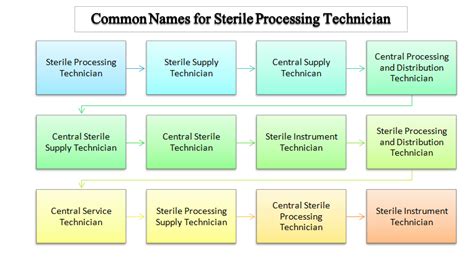Exceling in a Sterile Processing Tech apprenticeship requires a combination of technical knowledge, attention to detail, and dedication to delivering high-quality patient care. As a Sterile Processing Technician, you play a critical role in ensuring that medical instruments and equipment are properly cleaned, disinfected, and sterilized to prevent the spread of infections. Here are five ways to excel in your Sterile Processing Tech apprenticeship:
Understand the Fundamentals of Sterile Processing

To excel in your Sterile Processing Tech apprenticeship, it's essential to have a solid understanding of the fundamentals of sterile processing. This includes knowledge of microbiology, infection control, and sterilization techniques. Familiarize yourself with industry standards and guidelines, such as those set by the Centers for Disease Control and Prevention (CDC) and the World Health Organization (WHO).
Develop a strong foundation in sterile processing principles, including:
- Decontamination and cleaning techniques
- Disinfection and sterilization methods
- Packaging and storage procedures
- Quality control and assurance measures
Key Concepts in Sterile Processing
- Sterilization: The process of eliminating all forms of microbial life from an object or surface.
- Disinfection: The process of reducing the number of microorganisms on an object or surface to a safe level.
- Decontamination: The process of removing contaminants, including microorganisms, from an object or surface.
Develop Your Technical Skills

In addition to understanding the fundamentals of sterile processing, it's crucial to develop your technical skills in the following areas:
- Equipment operation and maintenance
- Instrument processing and preparation
- Sterilization and disinfection techniques
- Quality control and assurance measures
Familiarize yourself with various types of equipment, including:
- Autoclaves
- Dry heat sterilizers
- Ethylene oxide sterilizers
- Ultrasonic cleaners
Practice and refine your technical skills through hands-on training and experience.
Technical Skills Checklist
- Operate and maintain sterile processing equipment
- Process and prepare instruments for sterilization
- Perform sterilization and disinfection procedures
- Conduct quality control and assurance measures
Improve Your Attention to Detail

Attention to detail is critical in sterile processing, as even minor mistakes can have serious consequences for patient safety. To improve your attention to detail:
- Develop a systematic approach to processing and preparing instruments
- Use checklists and protocols to ensure consistency and accuracy
- Double-check your work to catch any errors or omissions
- Stay focused and avoid distractions during critical tasks
Practice mindfulness and attention to detail through exercises and training activities.
Attention to Detail Exercises
- Complete a mock instrument processing scenario
- Participate in a quality control and assurance activity
- Review and analyze a case study of a sterile processing error
Cultivate Effective Communication Skills

Effective communication is essential in sterile processing, as you will work with various healthcare professionals to ensure that instruments and equipment are properly prepared and sterilized. To cultivate effective communication skills:
- Practice active listening and ask clarifying questions
- Use clear and concise language when communicating with colleagues and supervisors
- Develop a professional tone and demeanor
- Be approachable and open to feedback and suggestions
Participate in communication training activities and exercises to improve your skills.
Communication Skills Checklist
- Practice active listening and ask clarifying questions
- Use clear and concise language when communicating with colleagues and supervisors
- Develop a professional tone and demeanor
- Be approachable and open to feedback and suggestions
Maintain a Positive Attitude and Professionalism

Maintaining a positive attitude and professionalism is critical in sterile processing, as you will work in a fast-paced and dynamic environment. To maintain a positive attitude and professionalism:
- Stay organized and focused, even in challenging situations
- Demonstrate a commitment to patient safety and quality care
- Be respectful and courteous to colleagues, supervisors, and patients
- Stay up-to-date with industry developments and best practices
Participate in professional development activities and training to enhance your skills and knowledge.
Professionalism Checklist
- Stay organized and focused, even in challenging situations
- Demonstrate a commitment to patient safety and quality care
- Be respectful and courteous to colleagues, supervisors, and patients
- Stay up-to-date with industry developments and best practices






By following these five ways to excel in your Sterile Processing Tech apprenticeship, you'll be well on your way to becoming a skilled and knowledgeable professional in the field. Remember to stay focused, organized, and committed to delivering high-quality patient care. Share your thoughts and experiences in the comments below!
What is the role of a Sterile Processing Technician?
+A Sterile Processing Technician is responsible for ensuring that medical instruments and equipment are properly cleaned, disinfected, and sterilized to prevent the spread of infections.
What are the key concepts in sterile processing?
+The key concepts in sterile processing include sterilization, disinfection, and decontamination.
What are some common types of equipment used in sterile processing?
+Common types of equipment used in sterile processing include autoclaves, dry heat sterilizers, and ultrasonic cleaners.
